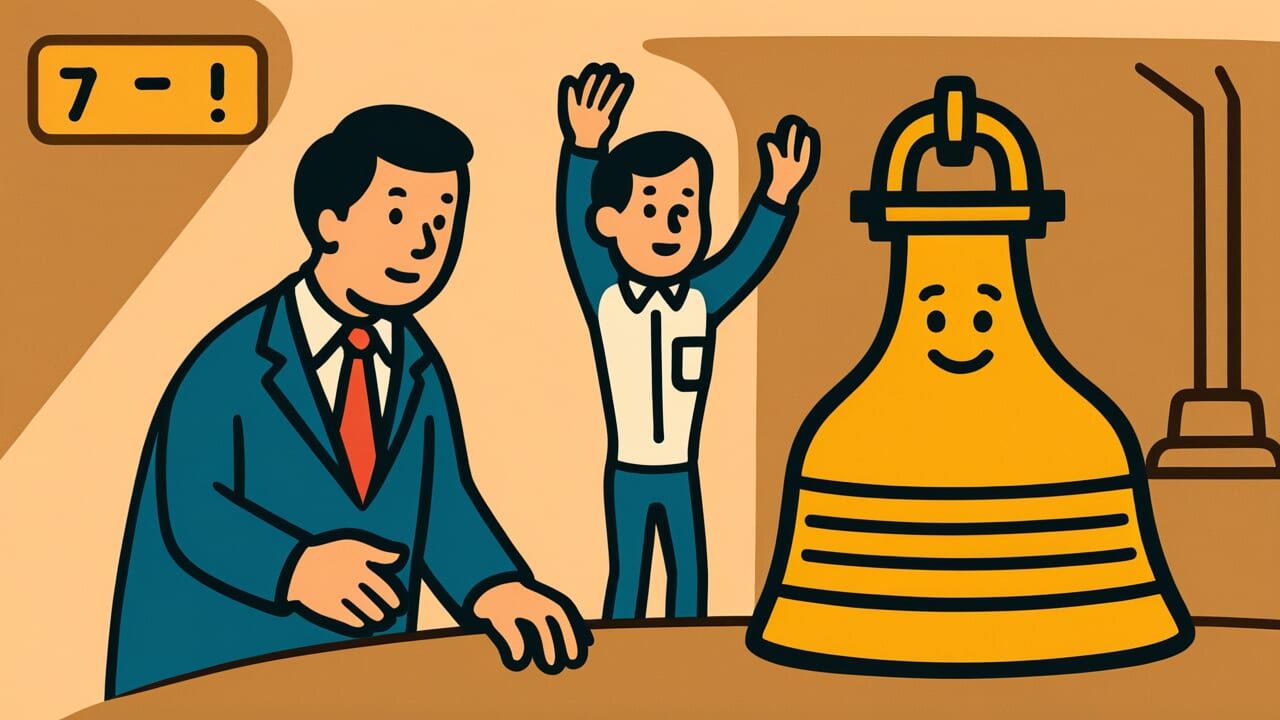How to Read “A master is like a bell”
Shishō wa kane no gotoshi
Meaning of “A master is like a bell”
This proverb means that a master only teaches when a student seeks knowledge.
Just as a bell makes no sound unless someone strikes it, a master won’t actively offer teachings unless the student asks questions or shows a genuine desire to learn.
This doesn’t mean the master is cold or unkind. Rather, it reflects a deep philosophy about education.
True learning comes from the student’s own initiative. The master doesn’t force knowledge on anyone.
Instead, when students develop their own questions and seek answers by approaching the master, real learning begins.
This idea remains important today. With a passive attitude, you can’t deeply absorb teachings, even from the most excellent master.
Only when you actively ask questions and show eagerness to learn will the master generously share their rich knowledge and experience.
Origin and Etymology
No clear written records document the exact origin of this proverb. However, we can understand how it developed by examining the bell metaphor.
A bell is an instrument that produces sound only when struck. No matter how magnificent the bell, it cannot ring its beautiful tone unless someone hits it with a striker.
This characteristic perfectly expresses the relationship between master and student.
In Japan since ancient times, temple bells have served to mark time and guide people. Yet these bells never ring by themselves.
They sound only when someone strikes them. This everyday scene likely became a metaphor for the relationship between those who teach and those who learn.
Buddhism and Confucianism may have also influenced this proverb. These philosophies emphasize the learner’s initiative.
A master can show the way, but true learning cannot happen unless the student actively seeks it.
Through the familiar image of a bell, this proverb expresses a profound educational philosophy that everyone can understand.
Usage Examples
- If you don’t ask your teacher questions, “a master is like a bell”—you won’t learn anything
- Since “a master is like a bell,” you can’t grow unless you show an active attitude toward learning
Universal Wisdom
“A master is like a bell” contains deep insights about human growth and learning.
Why did our ancestors compare a master to a bell? Because they understood that true learning is not passive but active.
People naturally expect knowledge and skills to be “given” to them. But history proves that real learning only happens when we seek it ourselves.
No matter how wonderful the master, their wisdom cannot transfer unless the student opens their heart and brings questions.
This truth is rooted in human nature. We learn most deeply when we feel something is necessary and choose it by our own will.
Knowledge forced upon us only scratches the surface. But teachings we seek ourselves become engraved deep in our hearts.
This proverb also shows the wisdom of the master’s side. An excellent master doesn’t force teachings on students who aren’t ready.
Like a bell waiting to be struck, the master quietly waits for the moment when the student’s heart opens.
This patience and trust nurtures a true master-student relationship.
When AI Hears This
Analyzing the acoustic properties of bells reveals surprising facts. With the same bell, shifting the striking point just one centimeter from center dramatically changes the frequency components of the sound.
Furthermore, striking with a wooden mallet versus a metal one excites completely different overtone components.
In other words, a bell isn’t simply “ring when struck”—it’s a system where “how you strike determines how it rings.”
Even more interesting is the resonance phenomenon. Bells have multiple “natural frequencies” where they resonate most easily.
For example, three in the low range and five in the mid range. Even with weak force, striking repeatedly at timing that matches these natural frequencies accumulates energy and produces surprisingly loud sound.
This physical law shows that “timing alignment” matters more than force magnitude.
The master-student relationship has the same structure. To draw rich learning from a master as a “resonating body of knowledge,” how you ask questions becomes critically important.
Vague questions are like brushing the bell’s edge—they produce almost no sound.
On the other hand, specific questions you’ve thought through deeply stimulate the master’s natural frequencies and draw out profound insights beyond your expectations.
The quality of learning is actually 90% determined by the receiver’s state of preparation and approach method.
Lessons for Today
This proverb teaches you that control over learning always belongs to you. In our modern society overflowing with information, knowledge seems easily available.
But what truly matters isn’t the quantity of information. It’s your clear intention about what you want to learn.
In the workplace, at school, and in every aspect of life, excellent masters and mentors surround you.
But they’re waiting for you to open your heart and ask. The words “please teach me,” the courage to question, and an honest attitude of wanting to learn—with these, the bell will always respond with beautiful tones.
Being passive might feel comfortable. But it won’t bring real growth. Have the courage to take that first step yourself.
When you seriously try to learn, people around you will share surprisingly rich wisdom. A master is like a bell.
If you strike it, it will surely ring. Taking that first step starts right now, in this moment.



Comments